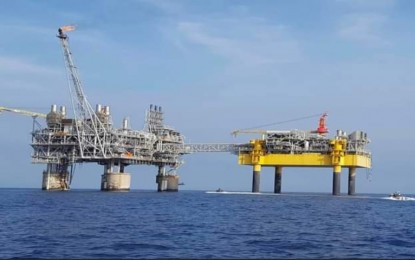
NATURAL GAS. The Malampaya gas field in Palawan. The House of Representatives has approved on final reading two priority bills identified by the Legislative-Executive Development Advisory Council that would develop the Philippines’ downstream natural gas industry. (Photo courtesy of Wescom)
MANILA – The House of Representatives has approved on final reading on Wednesday two priority bills identified by the Legislative-Executive Development Advisory Council (LEDAC) that would develop the Philippines’ downstream natural gas industry and establish an effective environmental and natural capital accounting.
During the plenary session, a total of 215 lawmakers voted to approve House Bill (HB) 8456 or the Philippine Downstream Natural Gas Industry Development Act (PDNGI), which would allow a shift of the country’s power generation away from coal and toward natural gas. Only three lawmakers voted against the measure, while no one abstained from voting.
House Speaker Martin Romualdez, author of the measure, said it seeks to promote natural gas as a safe, environment-friendly, efficient and cost-effective source of energy.
“It’s high time that we enforce, implement, and use clean energy to mitigate the effects of climate change. We have to start now to veer away from the conventional but hazardous method of generating power, for the benefit of our future generation,” Romualdez said.
House Bill 8456 provides regulatory policies and promotes the conversion of existing equipment and facilities from using fossil fuel to natural gas.
The Department of Energy shall be tasked to supervise and monitor the development of the PDNGI, as well as the regulation of the construction and operation of natural gas pipelines and related facilities for the transmission, distribution, and supply of natural gas.
The chamber also approved on third reading HB 8443 which seeks to establish the Philippine Ecosystem and Natural Capital Accounting System (PENCAS) with 215 votes.
The bill provides a framework that takes into account the country’s natural capital and its impact on the economy through the establishment of a system for the collection, compilation and development of natural capital accounts in the government as a tool for development planning and programming, policy analysis and decision-making.
The PENCAS will also serve as a comprehensive data framework in the generation of natural capital statistics and accounts for their progressive integration in macroeconomic indicators.
“We acknowledge that solid data is crucial in preserving and developing our natural capital and with this proposed legislation, we hope to provide tools and measures that can contribute to the protection, conservation, and restoration of ecosystems,” Romualdez said.
“This bill also intends to provide a framework in the generation of natural capital statistics and accounts toward their progressive integration in macroeconomic indicators that is why the Philippine Statistics Authority (PSA), the Interagency Committee on Environment and Natural Resources Statistics, the Department of Environment and Natural Resources, and the National Economic and Development Authority (NEDA) shall work hand-in-hand in the implementation of the measure,” he added.
Under the bill, the PSA will have the overall responsibility for the institutionalization and implementation of PENCAS following the System of Environmental-Economic Accounting framework.
This refers to a framework that integrates both economic and environmental data to provide a more comprehensive and multipurpose view of the interrelationships among the economy, the environment and ecosystems, and the stocks and changes in stocks of natural assets, as they bring benefits to humanity.
The bill also requires NEDA approval before commencing any development projects involving PENCAS, which are proposed to be undertaken by the national government, national government agencies, government-owned and -controlled corporations, LGUs, and private investors. (PNA)
